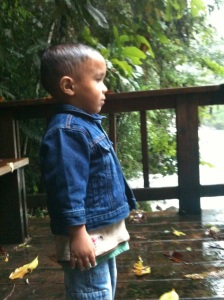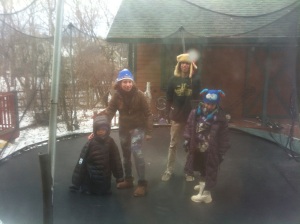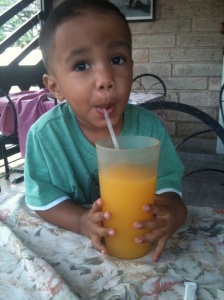My debut middle grade novel, Another Kind of Hurricane was sold on April 3, 2014. On that same day, I got a phone call from our social worker, asking if we would be interested in changing the age range of the child we were willing to adopt. We had been in the process of adopting a child for 3 years, and were approved up to the age of 24 months. She asked if we were interested in, let's say, changing the upward end of the range to 28 months.
Translation of that question: There is a child that the adoption committee wants to match you with. He is slightly older than the age range you requested. If you change your age range you will be matched with your son.
Answer to that question: Yes. And yes and yes and also yes.
 My book sold on the same day I found out about our son. Two excruciatingly long processes in the soil, sun and rain, and they flowered on exactly the same day.
My book sold on the same day I found out about our son. Two excruciatingly long processes in the soil, sun and rain, and they flowered on exactly the same day.
Explain that. (Seriously. I'm collecting reasons, magical and logical, for why these two journeys are so intertwined.)
Or I will explain it. Or I will try, at least. But bear with me? I want to finally write a little about my son, who just came to live with us in December. I've been protective of his journey, not wanting to expose him too much in too public a way, but there is a part of it that I want to explore now. Here. With you all. And I'm not sure why, but I think it has something to do with writing. Maybe. We'll see.
My son was born in Honduras and lived his three years there before we adopted him. He lived in the same town, with the same family. His life with his foster mother was secure and full of love. This is evident. He is fully himself wherever, thus far, he has been – in his home town; in Tegucigalpa, the capitol city of Honduras; on Roatan Island; on my parents' farm in very rural Vermont; and now, in my town in Vermont, in our little village, in our house. In all of these places, in all of these landscapes, he is…who he is. Do you know what I mean? He's got a solid sense of self. And he is very comfortable residing there. No need to defend himself, no need to hide himself.
I believe he is like this for two reasons: First, he came into the world this way. He must have. And second, his foster mother nurtured this in him – through her love and gift of security – during those critical early developmental years in his life. (The respect and awe I feel for her, this woman who took in my son with open arms, raised him, and then let him go with those same open arms…that is for another post another day.)
Because he has this innate sense of centeredness, he is very curious about and very comfortable finding the ways that he fits into the landscape of our family. And here is where maybe he and writing overlap? Or are woven together?
My son's first three years were full of the routines and rhythms of household chores. I'm learning this about him. He loves to do the laundry with me, for example, and learned the order of button pushing to start the washing machine by the second time we did it together. He loves to cook too. He sits on the counter, his short legs kicking the wooden drawer underneath him, and he dumps the flour, cracks the eggs, and pours the milk. Stir is one of his first English words. He watched my other 3 kids come home from school for about 3 days before he began taking their lunch boxes out of their backpacks and bringing them to me – because he realized that was what they did, day after day, right after they piled through the door and spilled into the house.
This kid watches routines. He feels rhythms. And then he acts. He finds the places where he can fit himself into the beat, into the music, into the pauses and patterns – and then he inserts himself. The earnestness with which he pursues this breaks my heart wide open. He is so transparent. He is so clearly identifying and claiming his place in the family, and in this new life. But – or maybe and – at the same time, he is so clearly tapping into something that is familiar to him at his core.
Rhythms and routines. This is how you write a book too, isn't it? On a meta-level: make a routine for your writing. On a micro-level: find and follow the rhythms of your characters' voices and of the story. But it's deeper than that. And I don't know if I can describe what I am feeling adequately here. (Maybe someone can give me insight after reading this?) There is an essential quality to my son's life right now…as in, he is practically all essence. There is an authenticity that buzzes through and around him that's palpable. Maybe this is because he is, in a way, being re-born right now. And that newborn time is all about essence and core and what-you-see-is-what-you-got, right? Most kids keep this for a while, some for a long while, so I am, by no means, suggesting that my son is unique in this…but I do think that, among the myriad of other reasons I am so lucky to be mothering this kid, I am privileged to be a part of this kind of essentialness in such an intimate way.
This – this essentialness – is what we strive for in our writing, isn't it? The transparency and truthfulness of the human spirit that breaks open the hearts (and minds) of our readers? That inspires them – in even the smallest ways – to live fully inside of themselves?
I don't know. I think so anyway. What I do know is that my son humbles me every single day.
With gratitude,
Tam





Oh, Tam! I can't say this any better than you have - so perfectly - but I love it so much. Thank you, thank you for sharing this beautiful amazing gift.
ReplyDeleteWow, Tam. So cool to hear about this. Thank you for sharing it. Congratulations on your family's newest member and all best wishes for your journeys together.
ReplyDelete